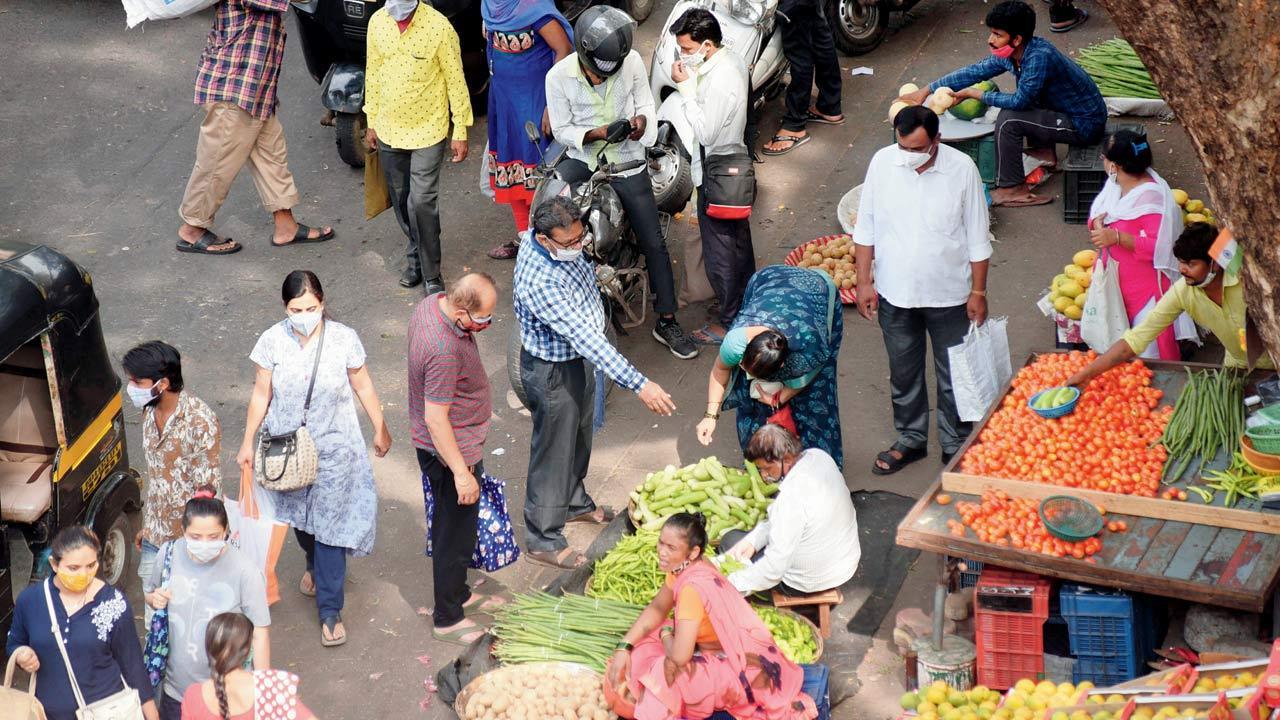Quickly judging others for their actions comes quite naturally to us because we like moving through life with blinkers on

Vegetable vendors and fruit sellers have been targeted for months now, blamed for rising infection rates, vilified for not wearing masks. What we refuse to do is look at why they are in the positions they are in. Pic/Sameer Markande
Not a week goes by without a friend or family member denouncing someone for not wearing a mask. The absurdity of this isn’t lost on me, but we seem to have adapted to a pandemic the way we adapt to most calamities: with a shrug. Masks are now as much a part of our lives as hand sanitizers, and we have conveniently forgotten about how things were before COVID-19 came calling. I suspect part of the reason is how this allows us to do what we do best: play the martyr and use it as another tool with which to declare our moral superiority over everyone else.
ADVERTISEMENT
Some of this criticism is valid, of course, because there is no way of justifying why a holiday in Goa, a party with friends, or shopping expedition to a mall is important at a time when millions of lives are at risk. It is the selective hypocrisy of our outrage that starts to rankle after a while. What we refuse to do is analyse why some people behave the way they do, writing them off as selfish instead of trying to empathise with their circumstances. We raise our voices in anger at the wrong people because it makes us feel better about ourselves.
Take vegetable vendors, for instance, or sellers of fruit outside railway stations. Let’s put aside the inconvenient fact that their presence is crucial to our existence, because we only missed them when they were forced to head home after that first insensitive lockdown. They have been targeted for months now, blamed for rising infection rates, vilified for not wearing masks, shamed for daring to sell us produce without maintaining social distancing rules. What we refuse to do is look at why they are in the positions they are in. These are men isolated in a city far from home for years at a time, compelled to move their stocks to and from wholesale markets without access to a safe and efficient transport system, completely reliant on daily sales for survival. It is hardly a surprise that wearing a mask isn’t going to be a priority for any of them. We would do the same thing if we were to find ourselves in their position.
Deliverymen are another soft target, because they appear to let their masks slip now and again, forcing holier-than-thou residents of societies to issue warnings on building WhatsApp groups about the virus being unleashed upon us by these heartless men. What we aren’t focusing on is what it means to carry packages back and forth in a city where summer temperatures can lead to heat stroke, and then accomplish this with a mask on for 10 hours at a stretch. Have you heard of courier companies offering workers sick leave?
And then there are the men and women on buses and trains, picked on because they have dared to step out. We refuse to acknowledge that they are compelled to take their lives in their hands because they have no choice, and because not going out is the equivalent of starving to death. No one wilfully chooses public transport on a normal day, let alone during a viral outbreak.
I recognise that no one is questioning the science behind the need for a mask. What I struggle with is the lack of empathy that turns us into vigilantes at the slightest provocation. We live in a country where the illiterate outnumber the literate. To expect everyone to understand what a pandemic is, or how a virus spreads, is naïve, given that few of us can grasp the principles of epidemiology.
We tend to pick on the vulnerable because we can’t fight powers bigger than ourselves. We don’t shame politicians for hosting political rallies because attacking a mask-less grocer is easier. We look the other way when thousands gather for a religious festival, but attack watchmen for daring to let their masks slip. We demand the most from those who have the least to give.
What happens when we shame those less fortunate than ourselves is that we inadvertently give a free pass to those responsible for putting them in harm’s way to begin with. We accept poor infrastructure, toothless labour laws that fail to protect livelihoods, and abysmal political decisions that have catastrophic effects on the economy. It often feels as if our fight isn’t against those who don’t wear masks as much as it is against those who don’t have as much money as we do.
When he isn’t ranting about all things Mumbai, Lindsay Pereira can be almost sweet. He tweets @lindsaypereira
Send your feedback to mailbag@mid-day.com
The views expressed in this column are the individual’s and don’t represent those of the paper.
 Subscribe today by clicking the link and stay updated with the latest news!" Click here!
Subscribe today by clicking the link and stay updated with the latest news!" Click here!






